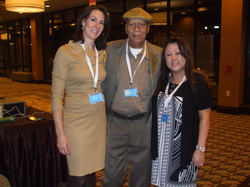I recently sat in on a Twitter Chat where one medical expert posted that “most patients now are empowered.” I had to disagree with such a blanket statement. I don’t find that to be the case- at least not in the lung cancer space. A disease like lung cancer is one that is rapidly moving from the moment of diagnosis to treatment to sometimes end-of-life in a matter of months. There is not a lot of time for later stage patients to become educated and empowered in their own care. I feel like such a declaration or belief, especially among healthcare professionals, may diminish their sense of responsibility to help navigate a patient through the process of their disease and treatment.
Not every cancer patient is an empowered patient.
I found that to be true in my own personal experience as a caregiver for my father. He was of the generation and mindset that followed the advice of his personal doctor and entrusted his life with the care that was prescribed. It took many months to convince him that he would benefit from a patient advocate and that knowledge could be powerful in finding treatments and care that would extend his life. Several interventions on my part saved his life. Watching for signs of dehydration and severe side effects helped his quality of life and being his voice when he was too ill to concentrate helped communicate his condition to his doctors. He outlived his 4 month prognosis by living 11 months and 21 days. On paper it doesn’t look like much and an article about lack of research, funding and treatment options for lung cancer will be saved for another day, but those additional 7 months were priceless for me and my family. I treasure every moment spent with him until he sighed his last breath. That’s when I made the decision to support others and be a patient navigator.
I met with another patient navigator recently and I learned that the majority of her patients were the same way too. Her patients were not advocates for their own health care. They relied on their health care team to know how to treat their conditions. She said her patients were consumed with the emotional fallout of having been diagnosed with cancer, employment concerns, family and relationship issues and the worry of leaving their families financially destitute. Many of her patients are not computer users and therefore didn’t find information over the internet. Many times adverse side effects or serious medical issues were reported much too late and situations became critical.
Where would someone like that find the time to seek out second opinions, clinical trials, new treatment options and medications to combat side effects? Most do well to learn about their diagnosis, stage and treatment plans. For these people there is a leap from the office visit to the ER with no care or information in between.
For the population of people who are not tech savvy or have the ability to go online, they miss out on the luxury of finding the answers they need online and getting answers elsewhere outside of their 20 minute office visit 1-2 times a month. I’ve even met patients a year outside of their diagnosis who did not fully understand their disease type or treatment options or long term side effects.
So how can we reach the seemingly unreachable patient?
· We reach patients by being the touch points between them and their medical team.
· We provide information in verbal, written and electronic forms.
· We help to navigate their diagnosis and investigate their options.
· We teach them the questions to ask and direct them to the people who have the answers.
· We provide support when they feel alone.
· We give them a reason to hope.
Before long, the newly diagnosed patient is empowered in their own healthcare.
They may not log into a Twitter Chat and discuss policy or healthcare with experts. They may not understand clinical trials or have the names of new drugs memorized, but they will know about their disease and their specific diagnosis enough to know they have the right to second and third opinions. They will know how to ask questions about their condition. They will understand that every day since the day they were diagnosed they have been surviving and that they are considered survivors. They will know that someone is here to help and that someone cares about them.
They will know enough to recognize when they are not getting the care they deserve.
If you have been impacted by lung cancer, visit LUNGevity Foundation for information, education and support.

 RSS Feed
RSS Feed
